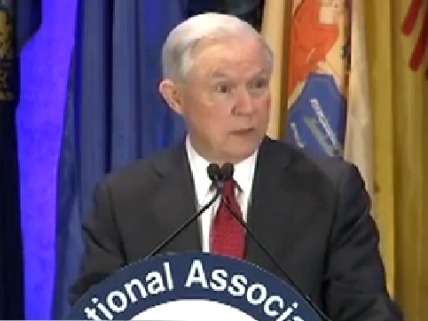Read Jeff Sessions' Utterly Illogical Defense of Tough Drug Sentences
The attorney general says there are no low-level, nonviolent drug offenders in federal prison.

Defending his new, tougher charging policy for drug offenders in The Washington Post, Attorney General Jeff Sessions once again declares that "drug trafficking is an inherently violent business." That claim has become a mantra for opponents of sentencing reform. But repeating it does not make it true. The violence associated with the distribution of currently banned drugs does not demonstrate that the business is inherently violent, any more than the violence associated with liquor distribution during alcohol prohibition showed that selling whiskey is inherently violent. The violence is a product of the prohibition policy that Sessions avidly supports, as he himself implicitly concedes in the next two sentences.
"If you want to collect a drug debt," Sessions writes, "you can't, and don't, file a lawsuit in court. You collect it by the barrel of a gun." And why is it, exactly, that drug dealers cannot avail themselves of the same legal, peaceful methods of dispute resolution that today's alcohol merchants routinely use? Only because their business is illegal, as the booze business was from 1920 to 1933.
In case some of his readers have taken a course in economics and might therefore be reluctant to blame black-market violence on the product being sold rather than its legal status, Sessons tries another tack. "For the approximately 52,000 Americans who died of a drug overdose in 2015," he says, "drug trafficking was a deadly business." And for the 88,000 or so Americans who die as a result of alcohol abuse each year, liquor trafficking is a deadly business. That does not mean alcohol should be banned, let alone that alcohol dealers should be subject to the severest possible criminal penalties. If drug-related deaths were Sessions' real concern, he would not support a policy that magnifies the hazards of getting high by making potency unpredictable, encouraging dangerous and unsanitary modes of consumption, and impeding harm-reducing education on subjects such as the potentially lethal risks of mixing opioids with other depressants.
Before you can digest Session' second nugget of illogic, he is ready with another non sequitur. "Defenders of the status quo perpetuate the false story that federal prisons are filled with low-level, nonviolent drug offenders," he says. "The truth is less than 3 percent of federal offenders sentenced to imprisonment in 2016 were convicted of simple possession, and in most of those cases the defendants were drug dealers who accepted plea bargains in return for reduced sentences." Yet a drug dealer is not necessarily a high-level drug dealer, let alone a violent one, and even someone who participates in the distribution of large quantities may have played a minor role in the operation. The list of drug offenders who received commutations from President Obama provides many such examples. Sessons can deny the existence of low-level, nonviolent drug offenders in the federal system only by redefining those adjectives.
But Sessions is just getting started. Before Attorney General Eric Holder announced a new charging policy aimed at shielding certain low-level, nonviolent drug offenders from mandatory minimum sentences, Sessions says, "the violent crime rate in the United States had fallen steadily for two decades, reaching half of what it was in 1991. Within one year after the Justice Department softened its approach to drug offenders, the trend of decreasing violent crime reversed. In 2015, the United States suffered the largest single-year increase in the overall violent crime rate since 1991." That's right: Sessions is attributing the 2015 increase in violent crime to a policy adopted in August 2013, a policy that may have resulted in shorter sentences for 500 or so federal drug offenders each year.
How would that have worked? Even if we assume that every drug offender who got relief under Holder's policy was a violent predator in disguise, there were not enough of them, and they would not have been free soon enough, to have any noticeable impact on the crime rate. Perhaps Sessions means that other criminals, taking note of the fact that some federal drug offenders who previously might have gotten five years in prison were now getting two or three years instead, were emboldened to commit violent crimes. That scenario is, if anything, less plausible.
According to Sessions, every federal drug offender is a violent kingpin who not only violates the government's arbitrary pharmacological taboos but poses an intolerable threat to the general public. As an old-fashioned drug warrior and tough-on-crime demagogue, the attorney general refuses to acknowledge distinctions among the wide variety of people the federal government puts behind bars every year. Without those distinctions, the criminal justice system cannot be cost-effective, and it cannot be just.


Show Comments (49)